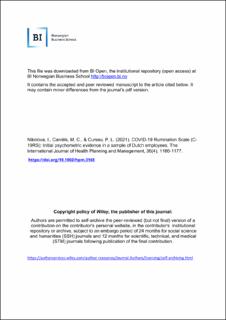| dc.description.abstract | Objectives Starting with the spring of 2020, COVID-19 pandemic has impacted nearly every aspect of our lives. Due to its threatening nature, along with the rapid rise in contamination and mortality figures, the spread of the virus has caused a considerable rise in individuals' anxieties. To enable the assessment of the COVID-19-triggered individual rumination, we developed and tested a COVID-19 Rumination Scale (C-19RS). Design and Methods Demographics (i.e., gender, age and education) and several items assessing the proximity of one's exposure to the virus (i.e., whether one's family and close friends are affected) were evaluated as antecedents of C-19RS that provided evidence for the criterion validity of the scale. A sample of 523 Dutch employees working in different companies and sectors completed the online survey in March 2020. Results Results showed that women, older individuals and workers with lower educational level ruminated considerably more about COVID-19. In keeping with prior theoretical and empirical work on stress and coping, we established that COVID-19 ruminative thoughts can unlock withdrawal coping reactions (i.e., self-handicapping) and drain individual's energy (i.e., causing emotional exhaustion), whereby providing evidence for the predictive validity of the new instrument. In addition, we examined how the COVID-19 rumination evolved during the nearly 3-week period of the data collection, a time-frame that coincided with the introduction of the national restrictive measures in the Netherlands. Results showed a drop in the level of rumination, which might be indicative of potential habituation with the stressor. Conclusions The results supported the sound psychometric qualities of the scale. | en_US |
